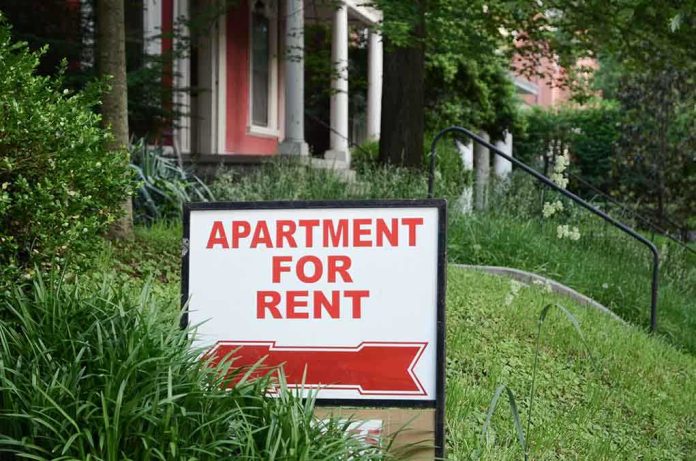
Six hundred thousand dollars evaporated from renters’ wallets in less than a year, all because a digital con artist hid behind a “too good to be true” apartment listing—could your next home search be a trap?
Story Snapshot
- Renters lost $600,000 to apartment scams in 2025, with cases skyrocketing on social media platforms.
- The FBI and consumer agencies have issued urgent warnings, highlighting scam sophistication and scale.
- Scammers copy real listings and lure victims with below-market rents and false urgency.
- The crisis exposes the vulnerabilities of the digital rental market and demands urgent regulatory and technological action.
Fraud Thrives Where Urgency Meets Anonymity
Scammers don’t need basements full of computer screens; they just need your anxiety, your dream of a new home, and a free Facebook account. In 2025, rental fraudsters unleashed a blitz on American renters by leveraging social media’s reach and the desperation of a tight housing market. Posing as landlords or agents, these criminals lift legitimate listings, slash the price, and claim they’re offering an exclusive deal—if you act now. Renters, eager to seize a bargain before it vanishes, transfer application fees or deposits, only to discover the property is as fictional as the promises made. FBI complaint data reveals that over 130 real estate scam reports referenced social media, culminating in $600,000 lost in less than a year.
Digital anonymity is the fraudster’s best weapon. Social media platforms, designed for rapid connections, allow scammers to vanish with a click or resurface under new aliases. Payment apps, once celebrated for convenience, become untraceable pipelines for ill-gotten funds. The scam’s precision is chilling: real photos, real addresses, spoofed agent credentials, and expertly crafted urgency. Renters are pressured to pay before viewing, and by the time doubts surface, their money is long gone. The FBI’s warnings are clear—verify, verify, verify—but for many, the admonition comes too late.
Rental Market Pressures Fuel Scam Success
A volatile rental market is the ideal hunting ground for digital predators. Urban housing shortages and surging demand leave renters feeling powerless. Scammers exploit this scarcity, knowing that many will ignore red flags if it means beating the rush to a coveted apartment. The COVID-19 pandemic turbocharged online apartment hunting; virtual tours and remote paperwork became the norm, eroding the safeguards of in-person interactions. As lease signings and payments migrated online, so did the risk. Housing market analysts point out that scam activity reliably spikes during periods of economic and supply uncertainty, when fear of missing out overpowers caution.
Past years saw warnings about Craigslist and email-based scams, but the current crisis is distinguished by the sheer financial damage and the dominance of social media as the scammer’s platform of choice. The $600,000 tally is not just a statistic—it’s a warning shot signaling that digital trust is more fragile than ever. Young adults, newcomers to cities, and those relocating for work are especially vulnerable, often lacking the experience or local contacts to spot a fraud in time.
The Stakes: Eroded Trust and Urgent Demands for Action
The impact of this scam wave ripples far beyond the unlucky victims. Financial loss is immediate—security deposits, first month’s rent, and fees vanish overnight. But the social cost is deeper: anxiety, suspicion, and a pervasive sense that the rental market is rigged against the honest. Landlords and legitimate agents suffer too, their reputations tarnished when their listings are hijacked and their names spoofed by criminals. Social media platforms, once champions of community, find themselves in the crosshairs—accused of enabling scams while scrambling to police billions of listings and messages.
The FBI and consumer advocates now urge renters to slow down, demand in-person viewings, and use secure payment channels. Yet, the underlying dynamics—digital anonymity, market desperation, and platform scale—remain stubbornly in place. Industry experts argue for a two-pronged response: platforms must impose stronger identity verification and scam-detection technology, while public education campaigns teach renters that skepticism is survival. Law enforcement, already stretched thin, struggles to keep pace with the evolving tactics of digital fraudsters, many of whom operate from overseas and vanish before authorities can intervene.
Where Do We Go From Here?
As the digital rental market matures, so too will its predators. Expect scams to grow more sophisticated, blending artificial intelligence with social engineering to outwit even the wary. Regulatory pressure is mounting—calls for platforms to authenticate listings and flag suspicious activity are gaining traction. Renters, bruised by experience, may demand in-person proof or flock to verified listing services, changing how business is done.
The $600,000 lost in 2025 is likely only a fraction of the true cost; many victims never report, embarrassed or resigned. The lesson, however, is not one of despair but vigilance. In a market where speed and convenience reign, the old wisdom applies: if an apartment deal looks too good to be true, it almost certainly is. The fight for trust in the digital age is only just beginning—and everyone searching for a home has a stake in who wins.
Sources:
AOL: Apartment scams on the rise as renters lose $600K
The Independent: New warning issued over apartment listings as renters lose $600K
New York Office of the State Comptroller: Housing Market Report 2025




